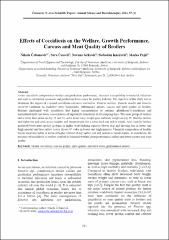Effects of Coccidiosis on the Welfare, Growth Performance, Carcass and Meat Quality of Broiler

View/
Date
2024Author
Čobanović, Nikola
Čalović, Sara
Grković, Nevena
Knežević, Slobodan
Pajić, Marko
Metadata
Show full item recordAbstract
Avian coccidiosis compromises welfare and production performance, increases susceptibility to bacterial infections
and leads to substantial economic and production losses upon the poultry industry. The objective of this study was to
determine the impact of a mixed coccidiosis (Eimeria acervulina, Eimeria maxima, Eimeria tenella and Eimeria
necatrix) challenge on oxidative stress biomarkers, performance indices, carcass and meat quality of broilers.
Broilers challenged with coccidiosis had higher concentrations of catalase, glutathione-S-transferase and
malondialdehyde and lower concentration of superoxide dismutases at all sampling days. The same group of broilers
had a lower feed intake on day 21 and 35, and a lower daily weight gain and body weight on day 35. Healthy broilers
had higher hot and cold carcass weights and breast weight, but a lower back and pelvis weight. Also, healthy broilers
produced better meat quality in terms of higher water-holding capacity (lower drip and thawing loss in breast and
thigh muscle) and less yellow colour (lower b* value in breast and thigh muscle). Chemical composition of healthy
broiler meat was better in terms of higher content of dry matter, ash and protein in breast muscle. In conclusion, the
presence of coccidiosis in broilers resulted in impaired welfare, poor performance indices and lower carcass and meat
quality.
